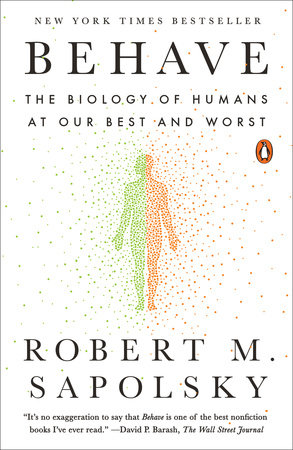It is a true blessing when havers of fancy knowledge, persons whose knowledge of a given complicated subject is at a ten, are willing and able to take time out of their busy schedules to explain their complicated subject to people whose starting level of knowledge is at a zero or one. Robert Sapolsky, fancy scientist and author of Behave: The Biology of Humans at Our Best and Worst, is a person like this.
Behave ranks up with Daniel Kahneman’s superb Thinking Fast and Slow for explaining complicated science to a lay reader. Sapolsky explores the regions of the brain responsible for our impulses and actions, the elements of environment that can shift us in one direction or another, and the genetic inheritances that shape us into who we are.
To say I learned a lot was an understatement, although I’m sure most of it will soon be swept away. I feel quite confident in my rudimentary grasp of the idea of heritability vs. inheritability, and that is the main thing that I wanted to make sure to hold onto. I like to criticize journalists for badly reporting scientific studies, and this heritability business seems like a crucial way to do it. (I don’t criticize them to their faces. I just do it inside my own head. Sometimes I go on Twitter and explain what really the study was showing vs what the media about it claimed it was showing.)
Sapolsky covers topics ranging from free will to how brains process dopamine to epigenetics, showing basically that these are all part of the same thing. And that thing — the brain and its ability to change — is understood better with each passing year, but so much still remains unknown to us. Sapolsky considers the example of archaeologists, who often leave the bulk of an important site unexplored, in the faith that those who come after them will have more sophisticated excavation techniques. What we know about the brain twenty years from now is likely to be miles different from what we know about it now — and Sapolsky is fully aware of this. So in the midst of his authoritative explanations about the brain, he’s careful to remind us that this is what we think happens, and that even the things we think happen are enormously context dependent.
Also, to my inexpressible joy, he shouts out Lamarck. Lamarck was a scientist who had this whole idea that you can inherit traits your parents acquired during their lifetimes, not just traits coded into your parents’ genes. Then science decided that Lamarck was wrong and laughed at him very much, and I have always felt that now that we know about epigenetics, some people owe Lamarck an apology. Sapolsky:
Lunatic! Buffoon! Epigenetically mediated mechanisms of inheritance — now often called “neo-Lamarckian inheritance” — prove Lamarck right in this narrow domain. Centuries late, the guy’s getting some acclaim.
THANK YOU SIR.
